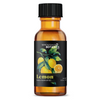
Is Lemon Essential Oil Safe for Dogs and Cats?
With its bright, citrusy scent and fresh feel, lemon essential oil is a popular choice for diffusers, cleaning blends, and DIY home products. It brings an uplifting, clean energy to any space. But if you share your home with pets—especially cats and dogs—you may be wondering, “Is lemon essential oil safe for dogs and cats?”
Let’s explore how this oil affects animals, what safety precautions to follow, and how to create a pet-conscious environment while still enjoying your aromatherapy routine.
Why Pets React Differently to Essential Oils
Essential oils interact with animals differently than they do with humans. This is especially true for cats and dogs, who process many aromatic compounds in unique ways.
The main reason? Liver metabolism.
Cats, in particular, lack a liver enzyme (glucuronyl transferase) that helps break down many compounds found in essential oils. This means certain oils can build up in their system over time, potentially leading to sensitivity or toxicity—even at relatively low exposure.
Dogs, while less sensitive than cats, also have a more acute sense of smell and different liver function. What smells pleasant or subtle to us can be overwhelming or irritating to them—especially if the oil is strong or improperly diluted.
Why Citrus Oils (Like Lemon) Raise Red Flags
Lemon essential oil is derived from the rind of lemons, typically through cold-pressing, and contains high levels of limonene and linalool. These compounds give lemon its bright, clean scent—but they’re also part of what makes it potentially problematic for pets in high doses.
In addition to liver-processing challenges, citrus oils are also known for being:
-
Photosensitizing (if applied topically, which we never recommend for pets)
-
Intensely aromatic—sometimes too strong for animal respiratory systems
-
Irritating to mucous membranes if diffused in high concentrations
Still, none of this means lemon oil can’t be used at all—it just means it must be used thoughtfully.
Is Lemon Essential Oil Toxic to Dogs or Cats?
Lemon essential oil is considered potentially toxic to pets if used improperly. The biggest risks occur when:
-
It’s applied directly to your pet’s skin or fur
-
It’s diffused in a small, enclosed space with no ventilation
-
Your pet ingests it or walks through an area where undiluted oil has been spilled
That said, lemon essential oil can be used safely around pets with the right precautions. The key is to keep your oil use diluted, indirect, and optional for your animals.
Guidelines for Using Lemon Essential Oil Around Pets
Keep these simple dos and don’ts in mind to keep your furry friends safe:
DO:
-
Diffuse in a well-ventilated room—and only when your pet can freely leave the space. Never trap them in a room with a diffuser.
-
Clean surfaces with diluted lemon oil blends, but make sure to rinse thoroughly and dry before pets come into contact.
-
Store essential oils safely, out of reach of curious paws and noses.
-
Observe your pet’s behavior when introducing any new scent. If they seem agitated, anxious, or withdrawn, turn off the diffuser and air out the space.
-
Use pet-safe dilutions if you're cleaning or scenting a space where pets sleep, play, or walk.
DON’T:
-
Don’t apply lemon essential oil directly to your pet.
-
Don’t diffuse oils in enclosed rooms your pet can’t exit.
-
Don’t use oils around newborn, elderly, or chronically ill animals without checking with a vet.
-
Don’t let pets lick or chew anything with lemon essential oil residue on it.
Remember, even a small amount of oil, if ingested or absorbed through the paws, can be irritating or harmful over time.
Safer Alternatives and Scent Substitutes
If you’re unsure about using lemon oil around pets—or if your animal seems sensitive to it—consider some gentler alternatives.
Pet-friendlier diffuser oils may include:
-
Lavender (Lavandula angustifolia): Soothing and generally well-tolerated by dogs
-
Frankincense: Grounding and subtle
-
Chamomile (Roman): Calming and gentle
-
Cedarwood (Atlas or Virginian): Earthy and typically pet-safe in small amounts
Always introduce new scents slowly and at low concentrations to gauge your pet’s response.
Cleaning with Lemon Oil in a Pet Household
Lemon essential oil shines in natural cleaning blends, and yes—you can still use it with pets in your home! Just be mindful of how and where.
Tips for Safe Cleaning:
-
Dilute well—a few drops per spray bottle of water or vinegar solution
-
Wipe surfaces thoroughly and rinse any area your pet may lick or lie on
-
Use lemon oil in linens, floors, or corners your pet doesn’t directly contact
-
Avoid using lemon oil in litter boxes, pet bowls, bedding, or toys
When in doubt, test a small area and watch your pet’s reaction before applying widely.
Talking to Your Veterinarian
If you're planning to use lemon essential oil regularly—or if your pet has a known health condition—it’s always wise to speak with a veterinarian first.
Some holistic or integrative vets are trained in aromatherapy and can give you species-specific, personalized guidance on which oils are safe and how to use them.
You can also keep your vet informed if your pet ever shows signs of discomfort after essential oil use, such as:
-
Coughing or sneezing
-
Squinting or watering eyes
-
Unusual behavior (hiding, pacing, restlessness)
-
Vomiting or drooling
The sooner you intervene, the better the outcome.
Final Answer: Is Lemon Essential Oil Safe for Dogs and Cats?

Lemon essential oil can be safely used in a pet-friendly home—with care. Diffuse lightly, never apply directly to pets, and always ensure the space is ventilated and optional for your animal.
Respecting your pets’ sensitive systems doesn’t mean giving up your favorite scents—it just means using them thoughtfully. With a few adjustments and extra awareness, you can continue to enjoy the fresh, cheerful aroma of lemon essential oil while keeping your four-legged companions safe and comfortable.
